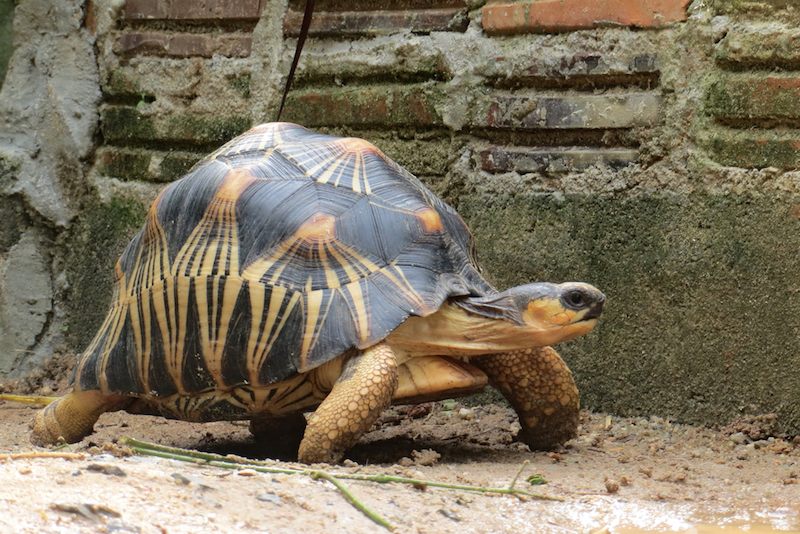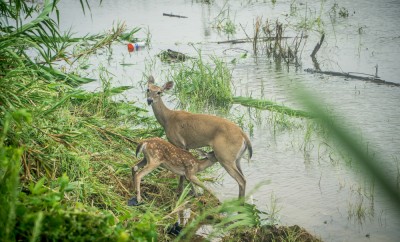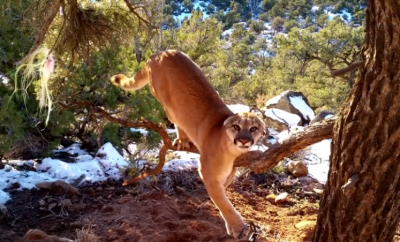Animals
Smugglers and the creativity of the illegal wildlife trade

Image: Shutterstock/Aekkaphum Warawiang
The critically endangered and uniquely beautiful radiated tortoise, an animal native to Madagascar, has become a prime target of international wildlife smuggling rings. Last month, Chinese police helped put seven members of such a ring into jail after one of them was caught in a Chinese airport with 316 radiated tortoises in February. After getting them into the airport and past customs, the smugglers would meet up with an accomplice, typically an airport employee, in the bathroom to hand off the goods. In this particular bust, the animals were wrapped in tin foil to prevent X-ray detection and then stuffed into bags. The smugglers hoped to later breed the animals and sell them for a profit through online forums and messaging groups. After the Guangzhou Intermediate Court tried the case, a jury determined the ringleader was to be sentenced to eleven years in prison while the rest of the team received between 21 months and seven years each.
Other tortoise and turtle breeds are also lucrative for smugglers
The Wildlife Conservation Society (WCS) feels this sentencing is just and preferable. Coordinator of Tortoise and Freshwater Turtle Conservation Brian D. Home explains his view that, “This sentencing sends a strong message to illegal wildlife dealers that the punishment for these activities will fit the severity of the crime. WCS is glad to have provided chelonian expertise for the prosecution.” Through the process of this case, 130 other tortoises were also retrieved from the smuggling ring. Previous noteworthy cases of tortoise smuggling were noted at the Detroit-Windsor Canadian border, where a Windsor-Ontario resident had strapped 50 turtles to his body and stuffed them in his underwear. The smuggler in this case had other types of the creatures in his drawers as well, including diamondback Terrapins, red-eared sliders, and Eastern box turtles, each worth up to around $800 in the illegal pet trade. Two Japanese nationals were nabbed at Los Angeles International Airport with 55 live turtles and tortoises hidden inside snack food boxes inside a suitcase, while another case included the retrieval of so many tortoises being smuggled at once, it equalled 10% of the radiated tortoise population of the world in one bag.
Numerous other animals are illegally traded and bred worldwide
These are interesting, although hardly rare occurrences. Creativity comes into play whenever the illegal wildlife trade flourishes. U.S. Customs and Border Protection’s Melissa Maraj shared her Detroit-Windsor border experience with Detroit News that, “Although this sounds really extreme, we see cases like this across the nation.” According to Edward Grace of the U.S. Fish and Wildlife Service Office of Law Enforcement, the United States, “seizes over $10 million worth of illegal wildlife each year, but this only scratches the surface. On any given day, someone, somewhere in the world, is poaching or smuggling wildlife.”
Other remarkable attempts include a man apprehended in French Guiana by airport officials for smuggling more than twelve live hummingbirds in pouches sewn into the waistband of his pants, which attracted attention as the animals squirmed to get free, causing him to fidget. Pygmy monkeys, also endangered, a bird of paradise, as well as more than fifty rare orchids, were found in a Los Angeles airport traveler’s suitcase upon a return from Bangkok, and a crocodile wriggled free from a smuggler’s duffel bag aboard a flight en route from the Democratic Republic of Congo, which caused such a panic that the plane crashed and killed twenty passengers. Tropical fish from Singapore were retrieved in Melbourne, Australia when customs officials heard a strange sound from beneath a woman’s skirt and found fifteen plastic bags sewn into pockets on an undergarment apron holding 51 tropical fish and enough water to temporarily sustain them. 247 boa constrictors, venomous pit vipers, and exotic spiders made up a smuggler’s attempted load discovered in Argentina by X-ray scans of the passenger’s socks, bags and some other containers. Bangkok’s Suvarnabhumi Airport officials arrested a man from United Arab Emirates with two baby leopards, two baby macaque monkeys, and a baby black bear in flat cages and canisters with air holes punched in them after being drugged to remain still for the flight. All of the animals were less than two months of age indicating they had likely been bred by people who intended to smuggle them. Leopards and panthers can typically be sold for up to $5,000 each on the black market in Thailand.
Crime only pays if we buy it
There’s no end in sight for illegal wildlife smuggling, but there are ways to help decrease it. Targeting those who might potentially buy illegally transported or bred animals can make a difference, as has been noted in the fight to ban and stop illegally sourced elephant ivory. Refusing to purchase endangered exotic pets and demanding to know where individuals selling them online, pet shops, roadside zoos and other types of “rescues,” live animal shows and other venues got their animals from before you pay them are ways to put an end to this unethical business.





0 comments